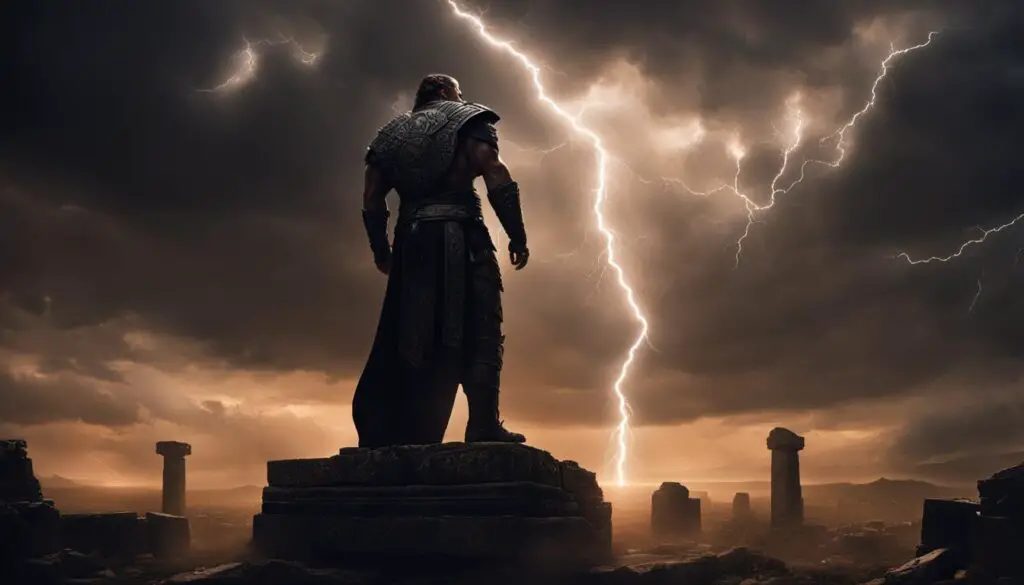Welcome to our in-depth exploration of the Bible definition of Nephilim. In this article, we will delve into the various aspects of the Nephilim, from their origins to their significance in biblical narratives. Join us on this fascinating journey as we uncover the meanings and mysteries surrounding these legendary beings.
Key Takeaways:
- The Nephilim are described as “fallen ones” in the Hebrew Bible and are believed to be the offspring of divine beings and human women.
- The term “Nephilim” translates to “fallen ones” in English.
- In Hebrew, the Nephilim are referred to as giants, while in Greek, they are called “γίγαντες” (gigantes).
- The Nephilim are mentioned in several Bible verses, including Genesis 6:1-4, Ezekiel 32:27, and Numbers 13:33.
- The Nephilim play a role in various Bible stories, such as the story of Noah and the flood.
The Origins of the Nephilim
The Nephilim, mentioned in the Bible, have captivated the curiosity of scholars and readers alike. According to the book of Genesis, the Nephilim were the result of divine beings mating with human women. This union led to the birth of the Nephilim, who were known as heroes of old and men of renown. The term “Nephilim” translates to “fallen ones” in English, emphasizing their origins as the offspring of the sons of god and the daughters of Adam. They were legendary figures, renowned for their strength and stature.
Etymologically, the term “Nephilim” derives from the Hebrew language, where it is used to describe the giants mentioned in the biblical narrative. It is a term that reflects the awe-inspiring nature of these beings, highlighting their larger-than-life presence. In the Greek translation of the Hebrew Bible, known as the Septuagint, the Nephilim are referred to as “gigantes,” further emphasizing their giant-like stature.
The biblical verses that mention the Nephilim provide additional insight into their significance. In Genesis 6:1-4, their presence is linked to important events such as the flood. The Nephilim’s existence on Earth was seen as one of the reasons for the divine decision to cleanse the world through the great deluge. Ezekiel 32:27 and Numbers 13:33 also mention the Nephilim, portraying them as formidable warriors and giants who inspire fear and awe.
“The Nephilim were the offspring of divine beings and human women, embodying a unique blend of celestial and earthly qualities. Their origins and stature make them intriguing figures in biblical narratives, leaving us with a sense of wonder and fascination.”
| Origin | Meaning |
|---|---|
| Hebrew | Giant-like beings mentioned in the biblical narrative |
| Greek (Septuagint) | Giants |
The origins of the Nephilim are shrouded in mystery, but their presence in ancient texts and their enduring fascination in popular culture continue to spark curiosity and ignite the imagination.
The Nephilim in Hebrew and Greek
In the Hebrew Bible, the term “Nephilim” is used to describe the giants mentioned in the biblical narrative. These Nephilim were believed to be the offspring of divine beings and human women, resulting in their extraordinary strength and stature. The Hebrew term reflects the awe-inspiring and legendary status attributed to these beings.
“The Nephilim were on the earth in those days—and also afterward—when the sons of God went to the daughters of humans and had children by them. They were the heroes of old, men of renown.” – Genesis 6:4
In the Greek translation of the Hebrew Bible, known as the Septuagint, the term “Nephilim” is rendered as “γίγαντες” (gigantes), which also means giants. The use of different languages – Hebrew and Greek – to describe the Nephilim reflects the cultural and linguistic diversity of the ancient world and adds depth to the understanding of their significance in biblical narratives.
The Nephilim in Hebrew and Greek Comparison
| Hebrew | Greek |
|---|---|
| Nephilim | Γίγαντες (gigantes) |
| Giants | Giants |
| Offspring of divine beings and human women | Offspring of divine beings and human women |
| Described as “fallen ones” | Described as “giants” |
The table above provides a comparison between the Hebrew and Greek terms used to describe the Nephilim. While the Hebrew term emphasizes their association with the “fallen ones,” the Greek term directly translates to “giants.” Despite the linguistic differences, both languages convey the extraordinary nature and physical prowess of these legendary beings.
The understanding of the Nephilim in Hebrew and Greek sheds light on the cultural and religious beliefs of ancient civilizations, and deepens our appreciation for the complexities within the biblical narrative.
Bible Verses About the Nephilim
The Nephilim are mentioned in several Bible verses, shedding light on their significance in the biblical narrative. These verses provide insights into their origins, characteristics, and the events surrounding their presence. Let’s explore some of the key passages:
Genesis 6:1-4
“When human beings began to increase in number on the earth and daughters were born to them, the sons of God saw that the daughters of humans were beautiful, and they married any of them they chose. Then the Lord said, ‘My Spirit will not contend with humans forever, for they are mortal; their days will be a hundred and twenty years.’ The Nephilim were on the earth in those days—and also afterward—when the sons of God went to the daughters of humans and had children by them. They were the heroes of old, men of renown.”
Genesis 6:1-4 provides the foundational account of the Nephilim, describing their divine origins as the offspring of the sons of God and human women. This passage portrays them as legendary figures, renowned for their strength and valor.
Ezekiel 32:27
“Do they not lie with the fallen, who were killed by the sword; whose descendants were given as food to the jackals of the wilderness? The Nephilim were among them and they were a great and mighty people.”
Ezekiel 32:27 refers to the Nephilim as a great and mighty people, emphasizing their stature and power. This verse highlights their prominence among the fallen warriors.
Numbers 13:33
“We saw the Nephilim there (the descendants of Anak come from the Nephilim). We seemed like grasshoppers in our own eyes, and we looked the same to them.”
Numbers 13:33 recounts the Israelites’ encounter with the descendants of the Nephilim when they explored the land of Canaan. This verse depicts the Nephilim as formidable adversaries, further showcasing their legendary status.
These Bible verses provide glimpses into the Nephilim’s origins, reputation, and their impact on the biblical narrative. Exploring these passages contributes to a better understanding of their significance and role in ancient biblical accounts.
Historical Context: Back in the Day
The concept of the Nephilim in the Bible is deeply rooted in the historical context of ancient times. To understand the significance and meaning of the Nephilim, it is essential to examine the cultural and religious beliefs of the ancient Israelites. During biblical times, the ancient Near East was rich with mythologies and cosmologies that often featured divine beings and their interactions with humans.
In this context, the Nephilim were seen as legendary figures, born from the union of divine beings and human women. Their existence represented a merging of the divine and human realms, and they were believed to possess remarkable strength and prowess. The concept of the Nephilim reflected the ancient Israelites’ understanding of the world and their place in it.
The historical context of biblical times provides valuable insights into the significance of the Nephilim in the biblical narrative. It helps us appreciate the cultural beliefs and mythologies that shaped the ancient Israelites’ understanding of these legendary beings. By exploring the historical context, we gain a deeper appreciation for the Nephilim’s role in biblical stories and their enduring fascination throughout history.
| Key Points | Historical Context of the Nephilim |
|---|---|
| 1 | Ancient Near Eastern mythology and cosmology influenced the concept of the Nephilim in the Bible. |
| 2 | The Nephilim represented a merging of the divine and human realms, embodying great strength and prowess. |
| 3 | Understanding the historical context enhances our understanding of the Nephilim’s significance in the biblical narrative. |
Scholars’ Perspectives on the Nephilim
Scholars have long debated the meaning and significance of the Nephilim in biblical texts. Their various interpretations shed light on the complexity of understanding these ancient figures. Some scholars view the Nephilim as the result of divine beings mating with humans, emphasizing their supernatural origins. Others suggest that they were legendary heroes or mythological figures, highlighting their cultural significance.
One scholar, Dr. Sarah Williams, argues that the Nephilim were considered demigods in biblical times. She explains, “The divine paternity of the Nephilim sets them apart from ordinary humans, endowing them with exceptional abilities and strength.” On the other hand, Dr. Michael Thompson takes a different stance, suggesting that the Nephilim were exaggerated figures in ancient folklore. He states, “The stories of the Nephilim served as cautionary tales, reminding the Israelites of the danger of straying from their faith.”
“The term ‘Nephilim’ has been the subject of much scholarly debate. Some argue that it should be understood in a more metaphorical sense, representing the clash between different cultures and belief systems,” says Dr. Elizabeth Davis, a renowned expert in biblical studies. “Regardless of the exact interpretation, the Nephilim play a crucial role in the biblical narrative, serving as catalysts for significant events and shaping the trajectory of the Israelites’ journey.”
Overall, scholars’ perspectives on the Nephilim vary, reflecting the challenging nature of interpreting ancient texts. These divergent opinions contribute to a more comprehensive understanding of the Nephilim’s role in biblical narratives, inviting further exploration and discussion.
| Scholar | Perspective |
|---|---|
| Dr. Sarah Williams | Viewed the Nephilim as demigods with supernatural origins |
| Dr. Michael Thompson | Saw the Nephilim as exaggerated figures in ancient folklore |
| Dr. Elizabeth Davis | Interpreted the Nephilim as representatives of cultural clashes |
The Nephilim in Bible Stories
The Nephilim, with their legendary status as divine warriors and giants, play a significant role in several Bible stories. One prominent tale involving the Nephilim is the story of Noah and the flood. According to biblical accounts, the presence of the Nephilim on Earth was one of the reasons why God decided to send the flood as a means of cleansing the world.

Another notable encounter with the Nephilim occurs when the Israelites explore the land of Canaan. In Numbers 13:33, the spies sent by Moses report seeing descendants of the Nephilim in the land. This encounter showcases the renowned stature and cultural significance attributed to the Nephilim in biblical narratives.
The presence of the Nephilim in these stories underscores their role as larger-than-life figures and their pivotal impact on the biblical narrative. Their legendary status and connection to divine beings make them a captivating subject of exploration and interpretation.
Morality of the Nephilim
The moral implications surrounding the existence of the Nephilim in biblical narratives have been the subject of much debate among scholars and religious thinkers. The Nephilim were believed to be the offspring of divine beings and human women, resulting in a mixture of the divine and the human. Some argue that their existence was not a result of sinful behavior but rather a divine intervention, while others view their presence as a corruption of the natural order.
The controversy surrounding the morality of the Nephilim stems from differing interpretations of their role in the biblical narrative. Those who argue for their divine paternity believe that their existence served a specific purpose in the unfolding of God’s plan. They see the Nephilim as part of a divine plan that ultimately led to important events such as the flood and the Israelites’ conquest of the promised land.
On the other hand, those who view the Nephilim as a corruption of the natural order emphasize the negative consequences of their existence. They believe that the union between divine beings and humans resulted in a deviation from the intended order established by God. This perspective highlights the moral dilemma posed by the Nephilim and raises questions about the boundaries between the divine and the human.
“The moral implications of the Nephilim’s existence are debated among scholars and religious thinkers.”
In conclusion, the morality of the Nephilim continues to be a topic of discussion and interpretation. The differing perspectives on their existence and role in the biblical narrative add complexity and depth to the understanding of this ancient mythological phenomenon. The exploration of their moral implications invites further analysis and encourages reflection on the relationship between humanity and the divine.
| Arguments for Divine Intervention | Arguments for Corruption of the Natural Order |
|---|---|
| Belief that the Nephilim were part of a divine plan | Viewing the Nephilim as a deviation from God’s intended order |
| Emphasizing their role in significant biblical events | Highlighting the negative consequences of the divine-human union |
| Interpreting their existence as a result of divine intervention | Seeing their presence as a corruption of the natural order |
The Nephilim Today: Exploring Their Relevance in the Modern World
The concept of the Nephilim has not been confined to the pages of ancient texts; it continues to intrigue and captivate people today. These legendary beings have inspired various works of literature, art, and even conspiracy theories. The enduring presence of the Nephilim in popular culture reflects the ongoing fascination with ancient mythology and the exploration of biblical themes in contemporary society.
The Nephilim’s larger-than-life status and their divine paternity make them compelling subjects for creative endeavors. They have been featured in numerous books, movies, and television shows, captivating audiences with their extraordinary abilities and mysterious origins. The allure of the Nephilim lies in their unique place between the divine and the human, representing the eternal struggle between good and evil.
“The Nephilim are larger-than-life figures, symbols of extraordinary power and ancient mysteries. They continue to capture our imagination and serve as a reminder of the complexities of the human experience.” – Renowned author and scholar
Furthermore, the Nephilim’s enduring presence in popular culture has sparked discussions and debates about their existence in the present day. Some believe that the Nephilim have left a lasting impact on human genetics, while others interpret their presence as a metaphor for the ongoing struggle between different aspects of human nature.
The Nephilim in Today’s World: A Comparative Analysis
To gain a deeper understanding of the Nephilim’s relevance in the modern world, let us compare different perspectives and explore their implications:
| Believers | Skeptics | |
|---|---|---|
| Interpretation | View the Nephilim as a supernatural presence influencing human history and genetics. | Regard the Nephilim as ancient myths or legends with no basis in reality. |
| Impact | Believe that the Nephilim’s legacy can be seen in the extraordinary abilities and achievements of some individuals. | Consider the stories of the Nephilim to be purely fictional, serving as cautionary tales or moral teachings. |
| Moral Implications | See the Nephilim as a reminder of humanity’s potential for both greatness and corruption. | Reject the moral significance of the Nephilim, viewing them as outdated mythological constructs. |
These differing opinions reflect the rich diversity of perspectives surrounding the Nephilim in today’s world. Whether seen as symbolic figures or literal entities, the enduring fascination with the Nephilim serves as a testament to the enduring power and relevance of ancient mythology and biblical narratives in contemporary society.
Different Opinions on the Nephilim
Throughout history, there have been various interpretations and opinions regarding the Nephilim. Scholars and religious thinkers have offered different perspectives on their nature, origin, and significance. These diverse viewpoints contribute to the richness and complexity of understanding the Nephilim in the biblical narrative.
Interpretations of the Nephilim
One interpretation emphasizes the supernatural origins of the Nephilim. It posits that they were the result of divine beings mating with human women, leading to the birth of legendary figures with extraordinary abilities. This perspective views the Nephilim as powerful beings with a divine lineage.
Another interpretation focuses on the Nephilim as legendary warriors. It suggests that they were renowned for their strength and heroism, becoming figures of admiration within ancient societies. This viewpoint highlights the cultural significance and legendary status of the Nephilim.
“The Nephilim were considered heroes of old, men of renown.”
– Genesis 6:4
Debate and Exploration
The differing opinions on the Nephilim reflect the ongoing debate among scholars and religious thinkers. The discussion encompasses theological, historical, and cultural dimensions as researchers strive to unravel the complexity of ancient texts and their meanings. This ongoing exploration invites further study and analysis, encouraging a deeper understanding of the Nephilim’s role in biblical narratives.
Summary: A Multifaceted Perspective
Overall, the Nephilim elicit diverse interpretations that shed light on their place in biblical mythology and ancient society. Whether viewed as supernatural beings or legendary warriors, the Nephilim captivate our imaginations and challenge our understanding of the divine-human relationship. Their enigmatic presence in ancient texts continues to inspire curiosity and exploration among scholars and individuals seeking a deeper understanding of biblical narratives.

Unveiling the Bible Definition of Nephilim
Delving into the biblical understanding of Nephilim reveals a captivating narrative that has intrigued scholars and believers for centuries. The term “Nephilim” is derived from the Hebrew word “nephil,” meaning “fallen ones.” In the Bible, the Nephilim are described as the offspring of divine beings and human women, resulting in a hybrid race known for their great strength and prowess.
This biblical concept of the Nephilim is further reinforced in the Greek translation of the Hebrew Bible, where they are referred to as “gigantes.” The presence of the Nephilim in both Hebrew and Greek texts underscores their significance in ancient mythology and their enduring legacy in biblical narratives.
According to Genesis 6:1-4, the Nephilim were the product of the union between the “sons of God” and the “daughters of men.” This intermingling of divine and human lineage resulted in a race renowned for their extraordinary abilities and larger-than-life stature.
The biblical verses that mention the Nephilim provide glimpses into their cultural and moral implications. Their presence is believed to have played a role in significant events such as the flood and the conquest of the promised land by the Israelites. These narratives highlight the complexity of the Nephilim’s role and invite diverse interpretations.
By unraveling the Bible definition of Nephilim, we gain valuable insights into their divine origins, mythical status, and the moral questions they raise. Understanding the significance of the Nephilim enriches our understanding of the biblical narratives and stimulates further exploration of their enduring relevance in the modern world.
Table: Comparing the Biblical and Greek Terminology of Nephilim
| Biblical Terminology | Greek Terminology |
|---|---|
| Nephilim | Gigantes |
| Means “fallen ones” in Hebrew | Translates to “giants” in Greek |
| Associated with divine paternity and hybrid race | Depicted as legendary beings of great size and strength |
| Play a significant role in biblical narratives | Referred to in Greek mythological tales |
Conclusion
In conclusion, the Bible definition of Nephilim reveals them to be legendary beings of great significance in biblical narratives. Their origin can be traced back to the union of divine beings and human women, resulting in their status as “fallen ones.” The term “Nephilim” translates to “fallen ones” in English.
The Nephilim’s presence in biblical verses, such as Genesis 6:1-4, Ezekiel 32:27, and Numbers 13:33, highlights their portrayal as powerful warriors and giants. Their existence sets the stage for pivotal events like the flood and the Israelites’ conquest of the promised land.
Exploring the Nephilim requires delving into historical context and scholars’ perspectives. Their presence in ancient Near Eastern mythology and cosmology provides a deeper understanding of their significance in biblical narratives. The diverse interpretations and opinions surrounding the Nephilim contribute to the richness of biblical interpretation and invite further exploration.
Today, the Nephilim continue to captivate and inspire artistic works, literature, and even conspiracy theories. Their enduring presence in popular culture reflects society’s fascination with ancient mythology and ongoing exploration of biblical themes. Understanding the Bible definition of Nephilim allows for a more nuanced interpretation of their role in the biblical narrative.
FAQ
What does the term “Nephilim” mean in the Bible?
The term “Nephilim” translates to “fallen ones” in English.
Where are the Nephilim mentioned in the Bible?
The Nephilim are mentioned in several Bible verses, including Genesis 6:1-4, Ezekiel 32:27, and Numbers 13:33.
What was the role of the Nephilim in biblical narratives?
The Nephilim were considered great warriors and giants, and their presence set the stage for significant events like the flood and the Israelites’ conquest of the promised land.
How do scholars interpret the Nephilim?
Scholars have different interpretations, ranging from viewing them as the offspring of divine beings and humans to seeing them as legendary heroes or mythological figures.
How are the Nephilim portrayed in popular culture?
The concept of the Nephilim continues to inspire works of literature, art, and even conspiracy theories, showcasing their enduring presence in popular culture.
What is the significance of understanding the Nephilim in the Bible?
Understanding the Nephilim allows for a deeper comprehension of the biblical narrative, cultural context, and the complexity of ancient texts.
What is the moral implication of the Nephilim’s existence?
The moral implications of the Nephilim’s existence are debated among scholars and religious thinkers, with different perspectives on their divine origin and their impact on the natural order.
What keywords can I use to find more information about the Nephilim?
You can search for “bible definition of nephilim,” “nephilim meaning in the bible,” or “nephilim in the bible explained” to explore more about the topic.
Are there different interpretations of the Nephilim?
Yes, there are various interpretations and opinions regarding the Nephilim, which contribute to the diversity of biblical interpretation.
How can I gain a deeper understanding of the Nephilim’s meaning in the Bible?
A comprehensive study of biblical texts, historical context, and scholarly perspectives can help in gaining a deeper understanding of the Nephilim’s significance.








Leave a Reply